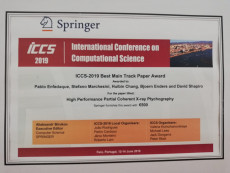Berkeley Lab Researchers Win Best Paper Award at ICCS
July 9, 2019
Five Berkeley Lab researchers were recently honored with a Best Paper Award at the International Conference on Computational Science (ICCS), held in Faro, Portugal, June 12-14. ICCS is an annual conference that brings together researchers and scientists from mathematics and computer science; researchers from various application areas who are pioneering computational methods in sciences such as physics, chemistry, life sciences, and engineering; and researchers from the arts and humanitarian fields.
Pablo Enfedaque, Stefano Marchesini, and Huibin Chang of Berkeley Lab’s Computational Research Division and Center for Advanced Mathematics for Energy Research Applications (CAMERA); Bjoern Enders of the National Energy Research Scientific Computing Center; and David Shapiro of the Advanced Light Source received the award for their paper, “High Performance Partial Coherent X-ray Ptychography.”
The paper provided an overview of the growing adoption of ptychographic imaging in several scientific disciplines and presented a unique solution for improving partial coherence X-ray ptychography in a high performance computing setting. The research team demonstrated that their algorithm can speed up data acquisition at the beamline by an order of magnitude while increasing the robustness of the reconstruction to non-stable measurements. The proposed implementation “exploits an efficient data layout and multi-GPU parallelism to achieve massive acceleration and efficient scaling,” according to the paper’s abstract. This is critical for handling the increase in computational requirements of the partial coherence analysis, the researchers noted.
“As always, submission to ICCS was very competitive this year, with nearly 600 papers submitted and an overall acceptance rate of only 25-30 percent," said Enfedaque, lead author who presented the paper at the meeting.
About Berkeley Lab
Founded in 1931 on the belief that the biggest scientific challenges are best addressed by teams, Lawrence Berkeley National Laboratory and its scientists have been recognized with 16 Nobel Prizes. Today, Berkeley Lab researchers develop sustainable energy and environmental solutions, create useful new materials, advance the frontiers of computing, and probe the mysteries of life, matter, and the universe. Scientists from around the world rely on the Lab’s facilities for their own discovery science. Berkeley Lab is a multiprogram national laboratory, managed by the University of California for the U.S. Department of Energy’s Office of Science.
DOE’s Office of Science is the single largest supporter of basic research in the physical sciences in the United States, and is working to address some of the most pressing challenges of our time. For more information, please visit energy.gov/science.










